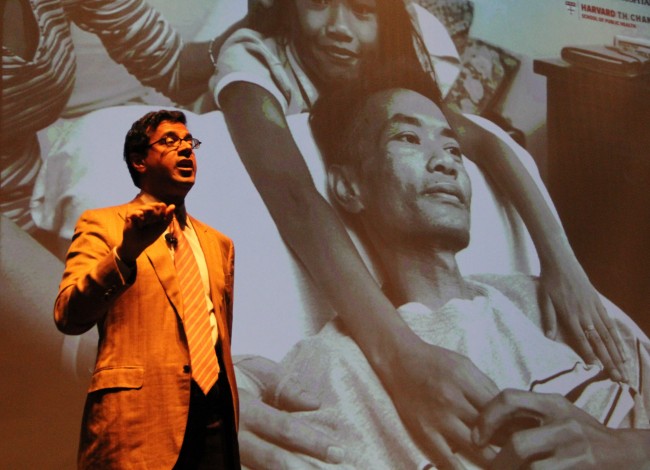Reknowned Surgeon Offers Insight to Address Patient Mortality

Facing a room filled with eager listening ears and eyes, Atul Gawande, MD, MPH, renowned surgeon, writer and public health researcher had one disclaimer.
“I do not come to you as an expert in palliative care,” he emphasized. “Rather, I come to you as someone who went on a path trying to figure out what it means to be a good doctor to people who are facing the end of life.”
On Friday, Jan. 8, The New York Times best selling author was the featured speaker for the Department of Medicine’s Grand Rounds. Many of the faculty, staff and students who attended held copies of Gawande’s newest book, “Being Mortal: Medicine and What Matters in the End.”
Gawande recounted personal stories of patients facing end of life, and how doctors – uncomfortable with discussing patients’ anxieties about death – fall back on false hopes and treatments that shorten lives instead of improving them.
“Ask your patients, what are you fighting for? Are you fighting for more time?” he said. “Or are you fighting for the best possible day today? Then, we can help give them direction. For a patient, it’s not about giving up. It’s about what they want to fight for.”
Gawande is no stranger to the struggles of his profession. A practicing surgeon at Brigham and Women’s Hospital, his new book examines medicine’s limitations and failures and examines his own practices, as well as others’, as life draws to a close.
“There’s a great fear that having these end of life conversations with a patient would take away hope and increase anxiety. I don’t think that is the case at all,” he said. “I never expected that I would have some of the most important and gratifying experiences of my career in helping people that I did not know how to cure.”
Having just read Gawande’s book over the holiday break, first-year medical student, Maria Eberle appreciated his presentation.“I really agree with his outlook on end of life care,” she said. “It’s so important for medical students and current doctors to hear his perspective and to learn how to have those hard conversations with those facing their mortality.”
View all posts